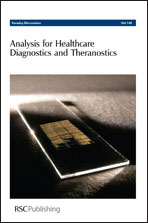Generic protease detection technology for monitoring periodontal disease
Abstract
Periodontal diseases are inflammatory conditions that affect the supporting tissues of teeth and can lead to destruction of the bone support and ultimately tooth loss if untreated. Progression of periodontitis is usually site specific but not uniform, and currently there are no accurate clinical methods for distinguishing sites where there is active disease progression from sites that are quiescent. Consequently, unnecessary and costly treatment of periodontal sites that are not progressing may occur. Three proteases have been identified as suitable markers for distinguishing sites with active disease progression and quiescent sites: human neutrophil elastase, cathepsin G and MMP8. Generic sensor materials for the detection of these three proteases have been developed based on thin
- This article is part of the themed collection: Analysis for Healthcare Diagnostics and Theranostics

 Please wait while we load your content...
Please wait while we load your content...